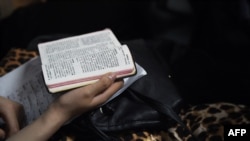Chinese courtrooms this month were the scene of two trials prosecuting Christian businessmen for selling audio versions of the Bible, a new crackdown that is part of a government campaign to “eradicate pornography and illegal publications.”
Lai Jinqiang, a Christian businessman whose company sells an audio Bible player — an MP3-like device that allows users to share passages from the Bible — was tried in a district court in China’s coastal city Shenzhen on December 7 for selling the electronic devices.
On December 9, four Christians, Fu Xuanjuan, Deng Tianyong, Han Li and Feng Qunhao, were tried by the same court for “illegal business operations.” They all worked for Life Tree Culture Communication Co., Ltd, whose main business is selling audio Bible players. The prosecutor recommended that the court sentence Fu, the owner of the company to five years in prison. The other three sentences ranged from 18 months to three years.
According to Bitter Winter, an online magazine on religious liberty and human rights, police are also reaching out to buyers of the Bible players to warn them about potentially breaking the law by making such purchases.
Audio Bible players
China for years has allowed sales of the Bible through official channels only. Currently, among China’s major religions, which include Buddhism, Taoism, Islam and folk beliefs, Christianity is the only one whose major holy text cannot be sold through normal commercial channels. The Bible is printed in China but legally available only at church bookstores approved by Beijing. Roughly two years ago, the Chinese government banned online Bible sales.
Audio Bible players, nevertheless, have become popular with people of faith in China because of their ease of use. Apart from Bible verses, these electronic players are also equipped with sermons, hymns and other religious content. They were widely available on China’s largest online commercial site Taobao.
Ma Jing, a Christian at a family church, told VOA that the government can detain and punish worshippers for whatever excuse they come up with.
“This is bullying,” she said, adding that she believes the reason the Chinese Communist Party controls sales of Bible-related products is that it fears a large number of Christians could pose a threat to its rule.
Gina Goh, regional manager for Southeast Asia at Washington-based rights group International Christian Concern, told VOA the ultimate purpose of the trials is to make people fearful.
“These are examples that serve the purpose of warning other Christians to stop spreading the theology or the words (of the Bible) through your business,” she said.
She added that this is another example that the Chinese government is increasingly cracking down on Christians.
“They want to have full control. Targeting these Christian businesses is just one of the many ways that they are trying to crack down on Christianity overall,” she continued.
Sui Muqing, a Chinese human rights lawyer, told VOA the trials were meant to stop the spread of the Bible.
"My feeling is that this is the same kind of suppression as before, it’s just now expanded to Christian businesses. In essence, these are no difference from past religious persecution cases," he said.
Christianity has been growing in China during the past two decades. According to a 2018 report by China’s State Council, from 1997 to 2018, Catholicism grew to 6 million worshipers from 4 million, while Protestantism increased to 38 million worshippers from 10 million.
Most surveys and experts, however, believe that these figures represent only about half the total number of believers, because each has a strong underground church that roughly matches the number of believers in government-run churches.
The Council on Foreign Relations estimates China is on track to have the world’s largest population of Christians by the end of this decade.
Retranslating the Bible
As part of a longstanding effort to limit the influence of Christianity in China, central government authorities last year indicated that they would publish an “official translation” of the Bible for Chinese worshippers.
The CCP called for “a comprehensive evaluation of the existing religious classics aiming at contents which do not conform to the progress of the times” in a 2019 meeting held by the Committee for Ethnic and Religious Affairs, which oversees religious matters in China.
The meeting concluded that the new “official edition” of the Bible must not contain any content that contradicts socialism, and paragraphs deemed wrong by censors will be amended or retranslated.




